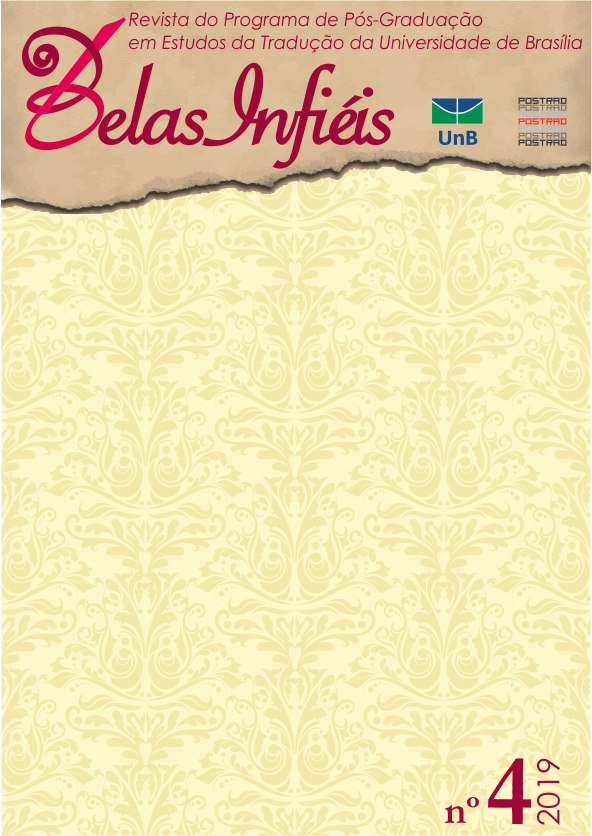Frontiers of translation in Monegal José tales
DOI:
https://doi.org/10.26512/belasinfieis.v8.n4.2019.24279Keywords:
Translation. Border. Regionalism. Gauchesca. José MonegalAbstract
Throughout studies of the translation theory (Octavio Paz, Rosimary Arrojo, Haroldo de Campos, among others) and experimenting with the translation act, the object of study is the work of José Monegal, a Uruguayan writer who, in the middle of the 20th century, published short stories in literary sections of newspapers of Melo and Montevideo, many of them today reunited in different editions. With characters set in the Pampas landscape, Monegal develops a gauchesque literature that opposes the mythical and heroic tradition, since it works with the humor and the grotesque, characterizing a gaucho figure trickster. In their texts, there is a language composed of regionalisms and oral or oral marks, requiring, in the translation into the Portuguese language, recreations that accentuate border marks, since this is another aspect present in their narratives. These are issues that are addressed in the research project "Frontiers of literary translation" developed together with scholarship students at the Universidade Federal do Pampa.
Downloads
References
ANTUNES, Benedito. Notas sobre a tradução literária. Revista Alfa, São Paulo, v. 35, p. 1-10, 1991.
ARROJO, Rosemary. As questões teóricas da tradução e a desconstrução do logocentrismo: algumas reflexões. In: ARROJO, Rosemary. (org.). O signo desconstruído: implicações para a tradução, a leitura e o ensino. Campinas: Pontes, 1992. p. 67-79.
AZAMBUJA, Darcy. Contrabandista. In: AZAMBUJA, Darcy. Contos escolhidos. Porto Alegre: Já, 2005.
CAMPOS, Haroldo de. Tradução e reconfiguração do imaginário: o tradutor como transfingidor. In: COUTHARD, Malcolm (org). Tradução: teoria e prática. Florianópolis: UFSC, 1991. p. 17-31.
MARTINS, Cyro. O príncipe da vila. Porto Alegre: Movimento, 1987.
MONEGAL, José. Cuentos escogidos. Montevidéu, Banda Oriental: 1967.
ROCCA, Pablo. La última frontera (El caso José Monegal). Revista Hologramática literaria ”“ Facultad de Ciencias Sociales ”“ UNLZ, ano I, n. 2, p. 6-32, 2006.
ROCCA, Pablo. Acerca de las representaciones de lo rural. Revista Tradiciones rurales. Comisión del Patrimonio Cultural de la Nación. Montevidéu, p. 14-22, 26 e 27 de setembro de 2009. RUAS, Tabajara. Netto perde sua alma. Rio de Janeiro: Record, 2005.
SCHLEE, Aldyr Garcia. Vocabulário de João Simões Lopes Neto. Pelotas: Fructos do Paiz, 2009.
SCHLEE, Aldyr Garcia. Dicionário da cultura pampeana sul-rio-grandense. v. II. Pelotas: Fructos do Paiz, 2019.
PAZ, Octavio. Tradução e metáfora. In: PAZ, Octavio. Os filhos do barro. Traduzido por: Ari Roitman e Paulina Wacht. São Paulo: CosacNaify, 2013. p. 85-105.
Downloads
Published
How to Cite
Issue
Section
License
Given the public access to this journal, the texts are free to use but requires the recognition of the original authorship and initial publication in this journal to be properly stated.
 The journal allows the use of works published for non-commercial purposes, including the right to submit the work to publicly accessible databases. Published contributions are the sole and exclusive responsibility of the author(s).Â



















